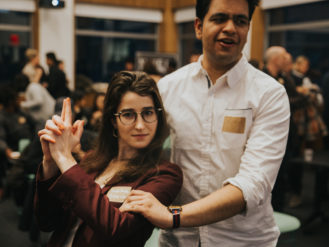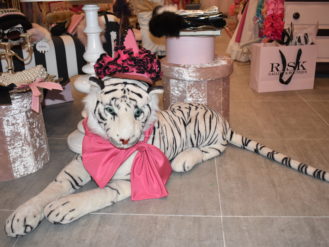Hand-made Soap’s Sweet Smell of Success
In Red Hook, two emerging brands are turning an ancient art into an elegant new enterprise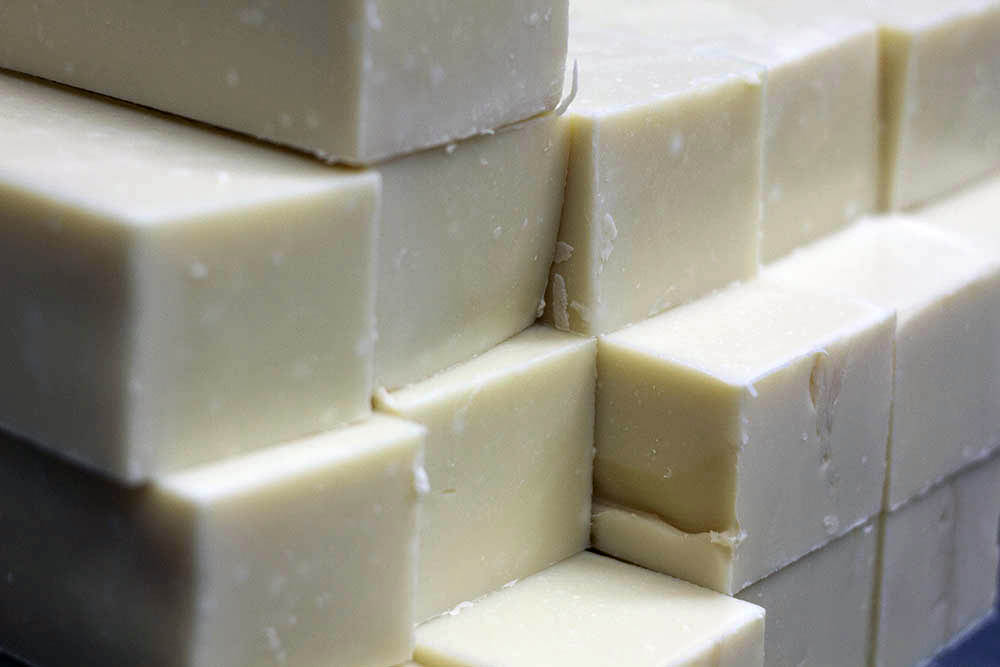
Blocks of soap from Apotheke, a brand that started with eight bars made with lavender from a farmer’s market (Photo credit: Courtesy of Apotheke)
First came the hand-made pickles, the chocolate and the beer. Now soap is having its Brooklyn moment. Hand-mixed, hand-cut, artisanal, cured soap. From Red Hook, which has never smelled so good.
Apotheke is the pioneer. Launched in 2011 in an apartment kitchen in Bedford-Stuyvesant, the company’s small-batch soaps, candles and scented diffusers are now sold in 700 specialty shops around the U.S., as well as in Europe and Japan. More recently, a very small operation, Mater Soap, has erupted like a spilled bottle of bubble bath in running water. The company is less than a year old and already filling orders with 19 wholesalers.
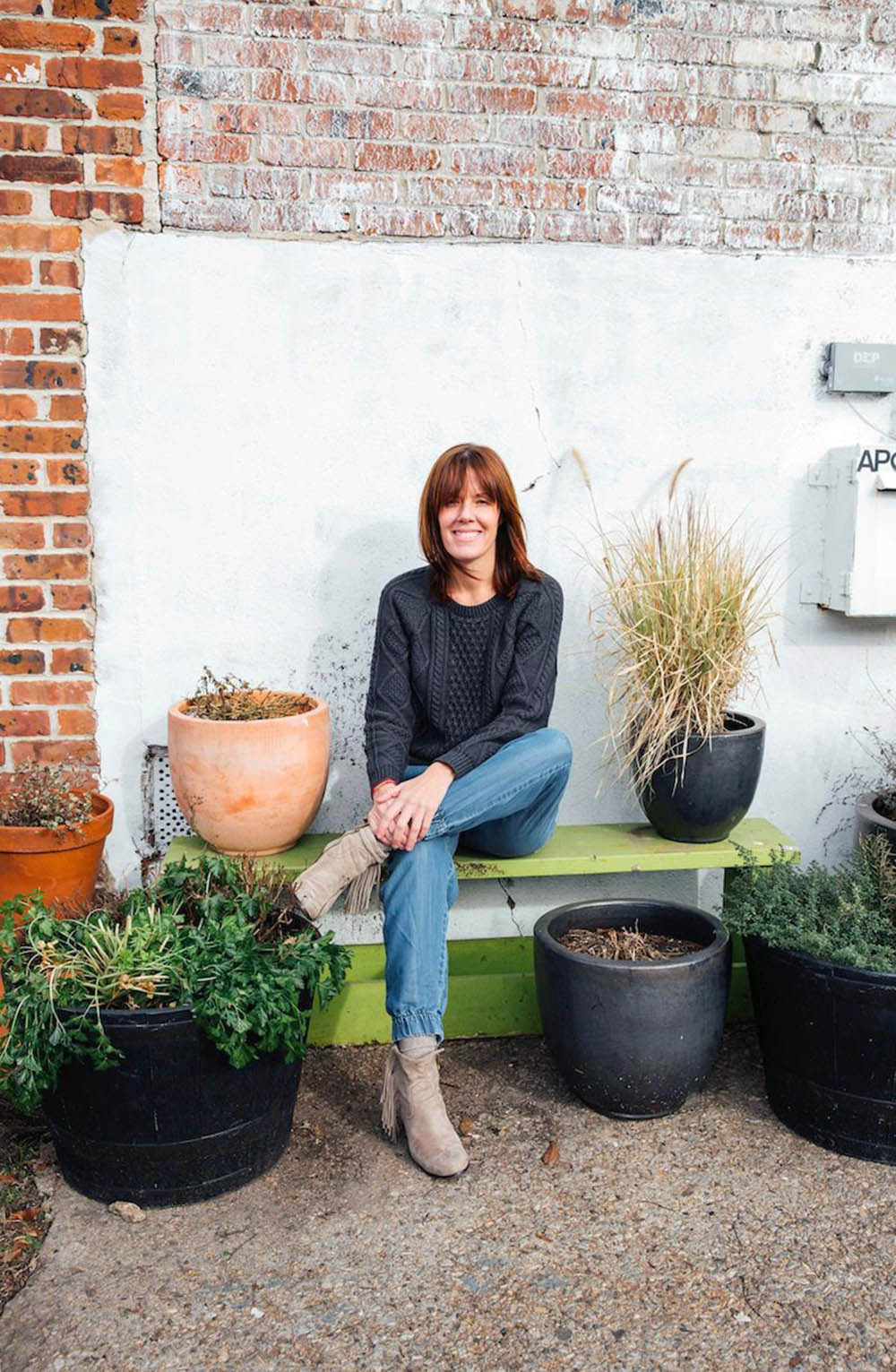
Chrissy Fichtl’s breakthrough moment happened one day at Brooklyn Flea (Photo credit: Courtesy of Apotheke)
This all started as a necessary distraction. It was 2010 and Chrissy Fichtl was having a rough year. Her dad had been badly injured in a car crash and didn’t have health insurance. She and her husband, Sebastian Picasso, were hustling to make ends meet with their personal-chef business, commuting often from Brooklyn to the Hamptons. She needed a hobby.
Starting With a Kit
Fichtl ordered an $80 soap-making kit. She made eight bars of soap using lavender from a farmer’s market and her husband’s cooking supplies. Sebastian loved the soap. Something clicked. “I took it as a green light to buy 50 pounds of coconut oil, and started selling these hideous bars of soap,” Fichtl said.
To sell her wares, she hit every market she could find. When Fichtl joined Brooklyn Flea in 2012, she was the only maker specializing in soap, she said, but her scale was miniscule. “I’d sell an $8 bar of soap,” she says, “and buy an $8 lemonade.”
One day in August 2013 a man walked up to her booth at Brooklyn Flea and told her he was developing a concept store to sell Brooklyn products. She gave him a soap and a candle to sample. “Three days later, I had a big enough order to get a factory,” Fichtl said. The man who had approached her was James Brett, Jr., the president of Dumbo-based West Elm, which has stores in more than 85 U.S. cities. He ordered 2,500 candles and 5,000 soaps, and needed them by November.
Fichtl made it happen. Her husband pitched-in full time, and they moved their operation into a small corner of a printing facility near their apartment. She filled the order and spent the rest of the holiday season selling soap at the Grand Central holiday market. She hired a sales team right after the holidays, and an operations manager shortly afterward. In 2014, Apotheke moved into a 3,500-sq.-ft. production space with soaring ceilings and sun-streaming windows in Red Hook, where six full-time employees can produce 700 bars of soap a day.
Quality Control: Testing, Testing
While quantity is way up, quality is still the watchword. One recent morning, Fichtl explained that everything in Apotheke’s small-batch, hand-mixed and poured operation is based on testing and research. Candle wicks are tested to make sure they burn properly, glass is tested to make sure it doesn’t get too hot, soaps are tested to make sure they lather well and moisturize while giving just the right amount of natural scent. “Each candle has a different recipe,” Sebastian says.
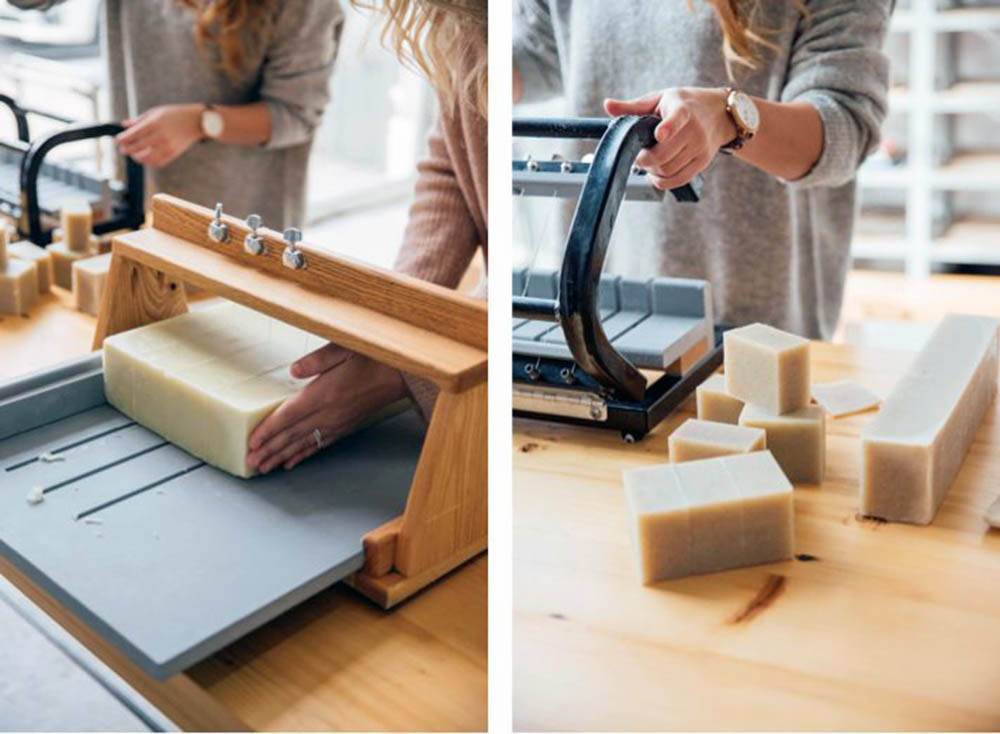
Apotheke is still made the hand-crafted way, which includes cutting and trimming the bars (Photo credit: Courtesy of Apotheke)
Apotheke still uses Sebastian’s mixing bowls and his big silver lobster pot, but they’ve added some industrial wax-melting machines to fill orders not only to West Elm, but to CB2 and Anthropologie, with national distribution, and Club Monaco in Japan. Carli Lampley, Apotheke’s operations manager and creative director, attributes the growth to well-organized regional sales teams for the West Coast, East Coast and South. Yet about half the orders come consumers and business owners who try the product and contact Apotheke directly, Lampley said. “You know you are doing something right when people seek you out,” she said.
Turns out the Brooklyn aura is as important as the natural aroma. “We live, breath, eat, drink Brooklyn,” Fichtl said. “Hand-made is what Brooklyn is. It’s what we are. When you live it, you don’t think about it. But to our fans and customers, it’s huge.”
Yet the Brooklyn brand is evolving into something more refined. Six years ago, “Brooklyn” meant rough-hewn, old-fashioned and painstakingly rendered. Today, it’s becoming a luxury brand, Fischtl believes, and Apotheke has transitioned with it. “People who live in Brooklyn have really good taste,” Fichtl said. “It’s still who we are. We’re just doing it better.”
Mixing Soap and Wine
Just a few blocks down the street, another duo is following Apotheke’s example. Textile artist Addison Walz and her college friend, Sarah Heslip, produce Mater Soap and other products in a small studio in a stone building near the bank of the New York harbor.
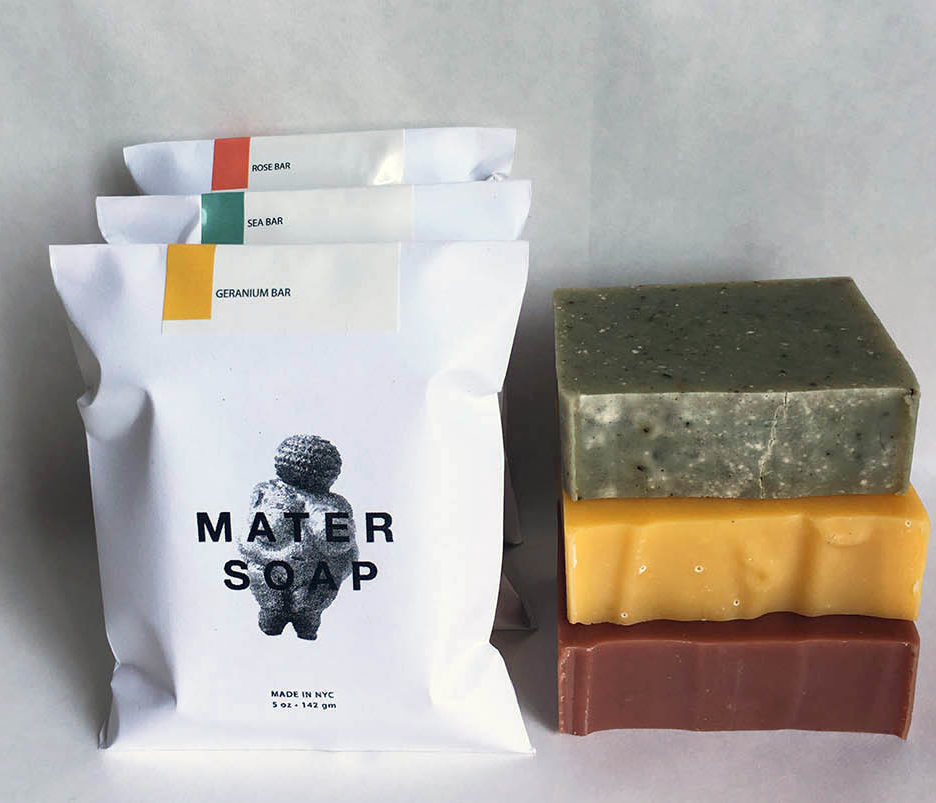
The duo behind Mater Soap named it after their mothers (Photo credit: Courtesy of Mater Soap)
Walking up the stairs toward their workspace, a visitor can smell refreshing and calming herbs filling the air. Upon entering, one sees the pots where the soaps are made and a pastry rack holding organically colored bars that cure for weeks before they’re shipped.
“Sarah and I had this weird shared desire to make soap,” Walz said. “We love the simplicity of it.” Soap, she explained, is a mixture of fats (either vegetable or animal) and lye (sodium hydroxide), a byproduct of burning wood, Walz said. “Those two things, when mixed, turn into something new,” she said. The process is called saponification, and many cultures claim its discovery, Walz said
She enjoys telling a legend of how it was created. One day long ago, an animal was sacrificed in a fire on a hillside. The fat from the animal, along with the ashes from the fire, ran down the hill, and the river below filled with suds, as Walz tells it. Voila: Soap is discovered.
Different ingredients affect how sudsy or creamy the soap is, explained Heslip. The duo has expanded their line to include face serum, hair serum, skin lotion and bath salts. Coming soon: candles. Mater Soaps are carried by specialty shops in Manhattan, Brooklyn, Los Angeles and Philadelphia.
For the moment, Mater Soap is still a side gig for the two. Walz crafts textiles by day. Heslip, who plans to get a degree this fall from Pacific College of Oriental Medicine in Manhattan, has begun to practice acupuncture and Chinese medicine.
“We make 64 bars once a week,” Heslip said, usually over a bottle of wine on a Friday night. “When we started selling soap to people we didn’t know, it was really rewarding.” Added Walz: “It would be great to grow this to where it’s a job. Right now, we squeeze it in. We’re paying rent, and that’s what counts. The ultimate goal is to expand one’s business and everyday be able to say, ‘I am having a great time, I love doing this, I am still true to my original philosophy.’”
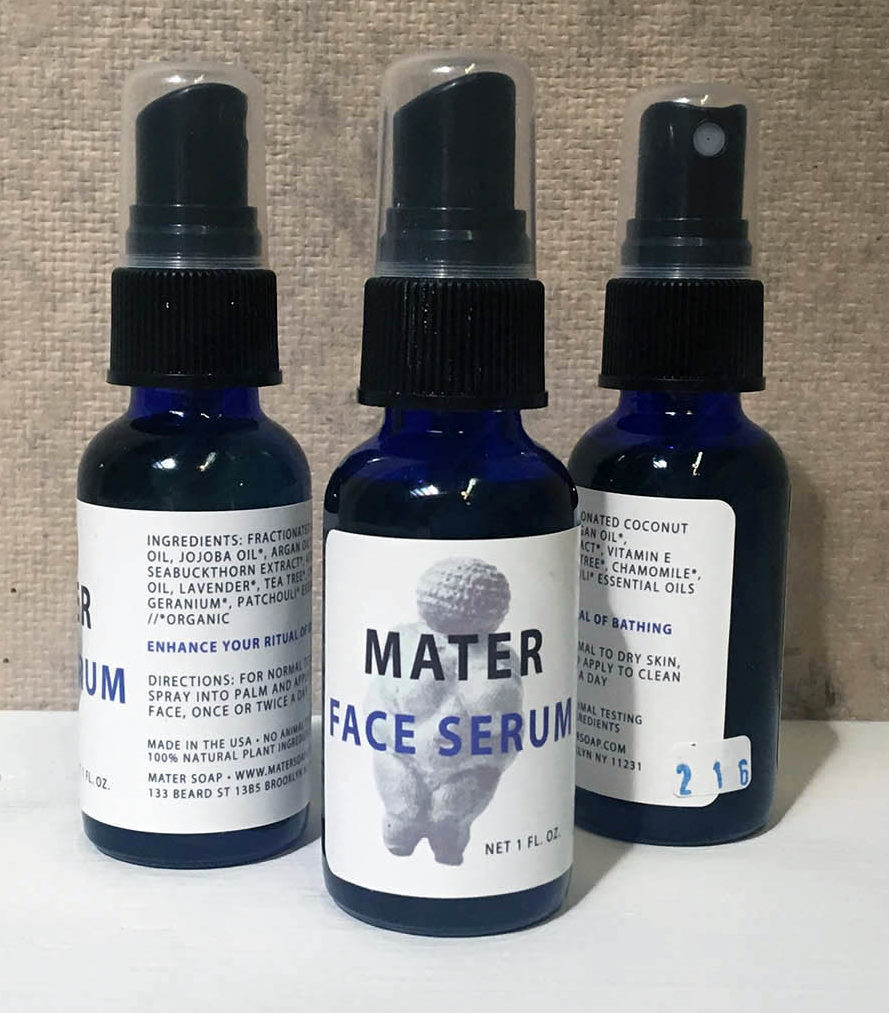
Mater has expanded into several new products, including face serum (Photo credit: Courtesy of Mater Soap)
The two named the company Mater as an homage to their mothers–and to the fathers who had to play that role after each lost her mother at a young age. They said their dads are big fans of the soap. And what about their role models down the street? Walz said they have never met the Apotheke team, who may soon learn that they have professional admirers. “I have walked by their workshop many times, peering in, feeling very inspired,” Walz said. “They have a beautiful product line.”





